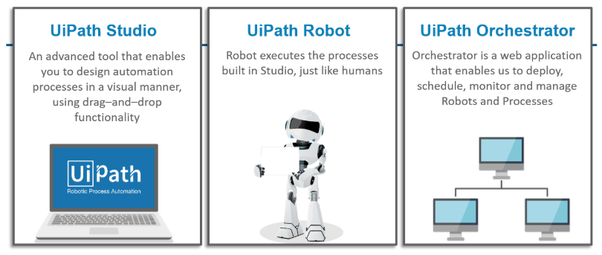Benefits of RPA Technology for Small Business
Introduction:
Robots are truly beginning to make their way into our world
and, probably sooner than many think, our businesses as well. One example is
robotic processes automation, which has emerged as a promising tool that can
help businesses of all kinds streamline operations and cut costs, while freeing
workers from repetitive tasks.
What Is Robotic Process Automation Technology?
Robotic process automation can, essentially, help businesses
to automate certain repetitive tasks — often mundane and tedious undertakings
that workers aren’t clamoring to do.
“The average knowledge worker employed on a back-office
process has a lot of repetitive, routine tasks that are dreary and
uninteresting. RPA is a type of software that mimics the activity of a human
being in carrying out a task within a process,” Leslie Willcocks, professor of
technology, work, and globalization at the London School of Economics’
department of management, tells McKinsey.
The tool itself can be designed to perform several tasks specific
to a company’s needs.
The Benefits of RPA Technology for Small Business
- For any business, RPA is what they make of it, and if used correctly it can help SMBs compete against larger competition
- Small businesses, in particular, can apply RPA “to stubborn business processes and whole business models,” Stephen J. Andriole, the Thomas G. Labrecque professor of business technology at the Villanova School of Business, writes in a guest column for BizTech.
- Andriole suggests tapping RPA alongside another tool, business process management, which if used correctly can help improve small business agility.
Tips for a Successful RPA Implementation
To help them avoid many of the issues that can accompany an
RPA implementation, Jim Shand, director of digital practice at AlixPartners,
suggested several steps businesses should take:
- Standardize processes
- Commit to a clear return on investment
- Prepare to reorganize workers and the workplace
- Maintain a pipeline of automation opportunities
- Clean the organization’s data
Moreover, it’s important to implement RPA only where it
promises to improve processes and show a clear ROI; it shouldn’t be pulled out
for every problem.
When used appropriately and in conjunction with the right
partner technologies, this tool can boost savings and streamline operations for
small businesses everywhere.
“BPM and RPA define small business agility,” Andriole says.
“SMBs can fire these weapons directly at large incumbents with great effect and
can use them to modify and disrupt small businesses processes and models for
competitive gain.”
Search Tags:
